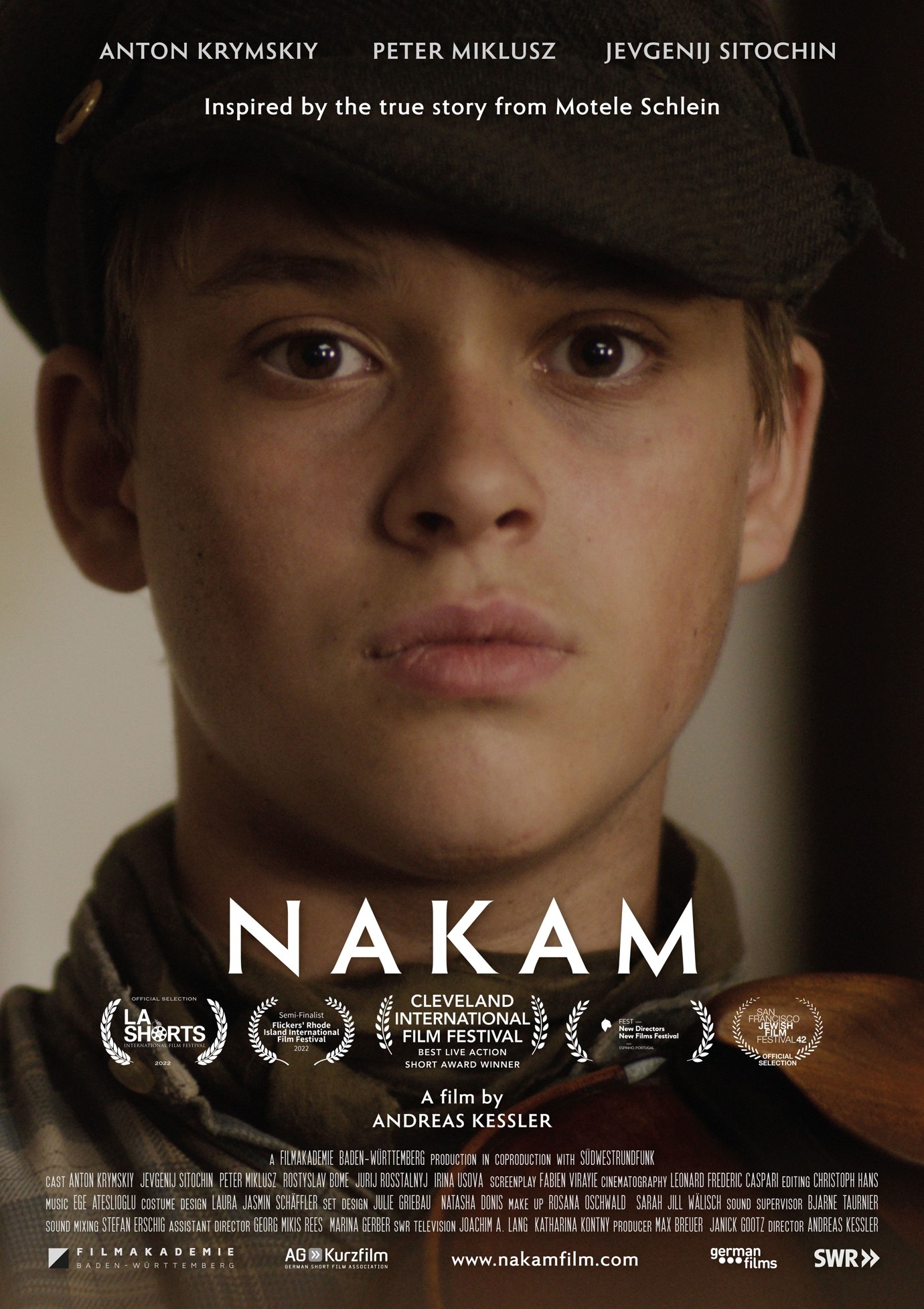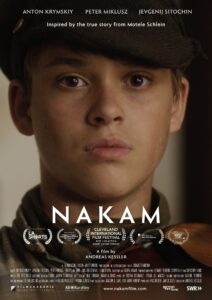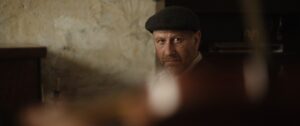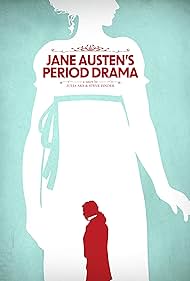
Oscar Qualifying Short Film Review “Nakam”
WATCH THE TRAILER HERE
First, the Recap:
Allegiance. Obligation. Retaliation. All of these words are representative of aggressively compelling purpose that can reside within us when we involve ourselves with endeavors that require total commitment to a cause, the last one more so when placed in the context of war. To align with those who are like-minded when it comes to engaging an adversary with the intent to undermine and upend their operations and find justice for atrocities beyond measure, it seems like an easy choice to be a part of. But what if in order to do so, you must not only overcome your fears, but give into a nature that may NOT truly be who you are? It is 1942, and in a small village in the Ukraine resides a 12-year-old boy, Mitka (Anton Krymskiy), who plays accompanying violin with his only true friend, pianist Yegor (Jevgenij Sitochin), in a small local eatery. But, when it comes to their attention via a Nazi SS officer, Seeger (Peter Miklusz), who advises a gathering of SS members is coming to meet, it puts Mitka on the offensive, as he’s part of a larger movement to end the Nazi tyranny.
Next, my Mind:
Unwavering commitment to a cause, the perils of justifiable yet absolutely blind hatred and desire for vengeance mixed with an irrefutable sense of duty and honor to an oppressed people, and the overwhelming realizations that manifest when understanding the high cost of it all that could come about, it’s a tense, sobering, and unflinching glimpse into the mindset of a rebellion and the harrowing instances experienced in times of war through this 33-minute Oscar qualifying short film effort from director Andreas Kessler, writer Fabien Virayie, plus producers Max Breuer and Janick Gootz. Truthfully, any film worth its salt that tackles the realities of conflict in any form should have this kind of gripping, forceful, purposeful building towards the inevitability being depicted as let’s face it, folks—there is NOTHING glorious about war or many of the harsh decisions that must be made in the name of liberation and self-imposed quests for justice–even IF said actions actually DO need to occur, at least in this critic’s opinion.
This foundational concept is given an even more affecting treatment as the narrative, set during World War II in the Ukraine, is told through the eyes of a 12-year-old boy who’s a part of something much bigger than just himself in the name of his people and their aims to disrupt the Nazi machine, yet who struggles greatly with the notion of what he must do and who it could ultimately impact for the worse, especially when it’s a close friend. The manner in which this unfolds is nothing short of credibly, profoundly transfixing in its deep, emotionally charged volatility as events occur, leading towards what could end up being one of the most gut-wrenching yet–necessary(??)–choices for a child to make, even in spite of his already having been a part of the group he is, becoming a death of innocence, and then potentially shouldering guilt and regret on top of it all. Honestly, for this critic, the film carries that much weight, and does so with brilliantly crafted levels of writing and overall execution, sometimes subtle, other times intense.
The beauty of the bonds of friendship, the atmosphere of hesitancy and fear, the burden of past circumstances that set someone on the path of wanting retribution, and the sheer maliciousness of those who want nothing but suffering and subjugation of others for their own supposed “glory” are additional thematic explorations that take place throughout the film’s perfectly timed length, allowing everything to be fleshed out without there being any iota of “slow down” or disengagement for the viewer. The imagery we’re entreated to does such a fantastic job of visually capturing every little nuance being portrayed and one thing that also struck me is that music manages to create this needed degree of light during the sequences involving it, artistically designed to showcase SOME level of hope in the midst of darkness. The film is based on the true story of Motele Schlein, whose violin is in the Yad Vashem Holocaust Remembrance Center in Jerusalem, Israel. After seeing this film, would be more than worth the time if the chance would come about to visit.
Krymskiy is nothing short of amazing here in having to so fully and believably embody the portrait of both stirring irreproachability and a virtually remorseless vehicle of reckoning through his role as Mitka, a young boy residing in a small Ukranian village mainly attempting to just live and entertain the local people with his nearly virtuoso violin pieces, alongside his best (and perhaps only), piano-playing friend. Yet, beneath his cherubic facade, Mitka has another more veiled side to him that ends up being thrust to the surface when their little slice of “peace” gets interrupted by the news SS officers will be coming to meet at the inn. It heralds a chance in Mitka that is then revealed to us even as his friend Yegor tries in general to warn him about pushing too hard against the invaders, not knowing who Mitka is actually involved with. It’s an extreme air of tension that soon follows, and Krymskiy so adeptly draws you completely into Mitka’s plight with utter passion, energy, and unfeigned resonance that hits your heart and mind in every way.
Sitochin provides a wonderfully presented, impassioned yet understated, foil almost to Krymskiy’s underlying then blatantly burning fervor through his role as Yegor, Mitka’s most treasured friend and musical partner whom we can tell acts like a surrogate father figure to him. Once the Nazi’s arrive in town and begin to cause the evident and predictable unease, it is Yegor who tried to comfort Mitka and his total hatred of them, again unbeknownst to him what his young friend is really a part of. It’s a strong performance that speaks volumes to the character’s place in events. Likewise, Miklusz delivers such a tangibly effective performance in creating that character you totally love to hate through his role as SS Officer Seeger, a man of hauntingly arrogant and undeniably menacing attitude who arrives to advise more of the SS will be in town soon to meet. His calm yet untrusting of anyone other than other Nazis demeanor is conspicuous and unyielding as are his suspicions of Mitka, and how Miklusz navigates the character through this shifting manner is just deftly accomplished, grounded, and wholly convincing.
The primary supporting appearance arrives through Rostyslav Bome as the head of the group Mitka is a part of, and who must do his own best effort to ensure that Mitka remains on board with the task he has been given to carry out. Additional appearances are made by Jurij Rosstalnyj, Irina Usova, Johann Zurner, Andreas Pape, Markus Glaser, and Ralf Zillmann. So, in total, “Nakam”, with its finale that will leave you breathless, is a formidably ardent, intelligently devised, keenly dramatic, and thoroughly fascinating short film that is willing to plumb the desperate depths and lengths war pushes people to while still making us realize that even when we are placed in such a place where excessive initiatives are utilized, it doesn’t negate the inward strife and damage it can cause to our heart, mind, and soul as human beings. That perhaps is the ultimate lesson of why we need to see an end to war, senseless hate, and all other such negatively impactful situations against our fellow man so that we don’t have to encounter a tainting of who we really are.
As always, this is all for your consideration and comment. Until next time, thank you for reading!






